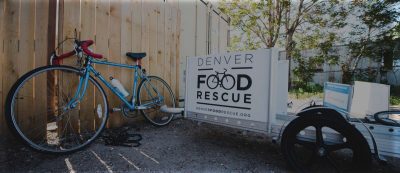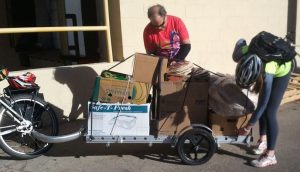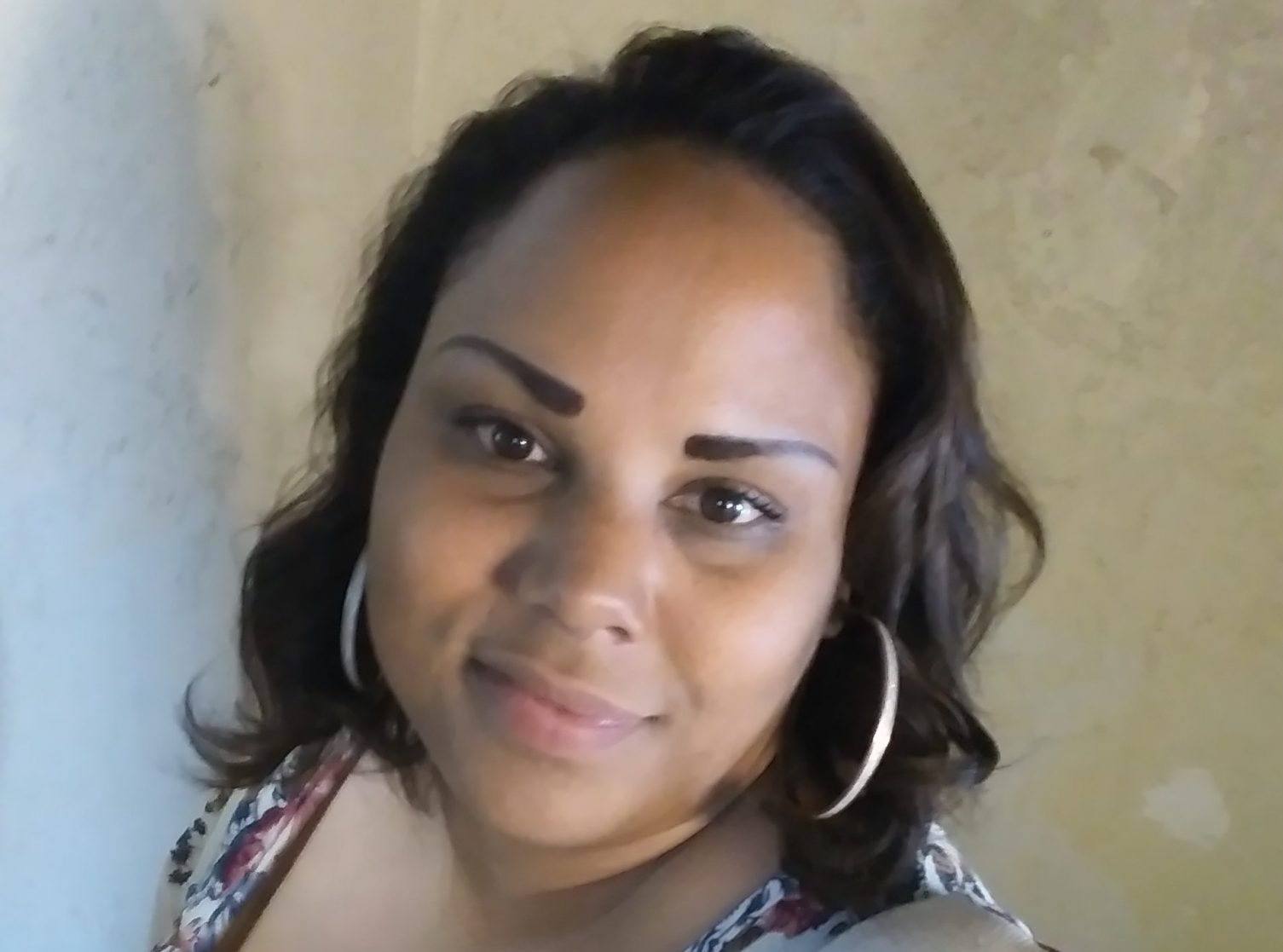Welcome to our Changemaker Profiles blog series! Each edition we profile one outstanding social changemaker from the JVA client community. By sharing the stories of some of the incredible people we get to work with every day, each accomplishing extraordinary work in nonprofits, government, social enterprise and elsewhere, we hope we will bring a little light and inspiration to your day!
For this edition, in November 2019 we spoke with Christine Alford, the new executive director of Denver Food Rescue (DFR). DFR uses bicycle power and volunteers to save good produce from grocery stores, farmers markets and distributors that would otherwise be thrown away. It then redistributes the food directly to organizations that work with food-insecure communities. DFR’s programs include 17 no-cost grocery programs, food rescue, and the Bondadosa food delivery service.
Christine became DFR’s executive director (ED) in April (2019) and attended JVA’s Executive Director Academy in September. Prior to becoming ED, she was DFR’s program director, and in 2015 she was a DFR program participant.
1. Tell us about your organization and the social change you are trying to achieve.
“Denver Food Rescue is a nonprofit organization whose mission is to produce health equity with Denver neighborhoods. So, the social change we are trying to achieve is to address the access that communities have to healthy food, and making sure that we do this in a way that is inclusive and diverse, is meaningful in giving back dignity to the community—providing them a way to knock down some of the barriers and challenges that each individual community has and be able to tailor solutions in a way that meets the needs of their direct communities.
“We have several programs. We have our social enterprise Bondadosa, and we also have a Fresh Food Connect chapter to go along with our no-cost grocery programs. All of them are mission aligned, with the same goal to create access to healthy food and to do our environmental due diligence on sustainability, to rescue food from going into the landfills.”
2. What keeps you inspired and going when things get tough?
“Coming in from lived experience and not necessarily a nonprofit or academia background, a lot of things get tough, but what is always on my forefront is thinking about  back when I was utilizing the resource and what impact it made on my family and how I was able to provide access to healthy fruits and vegetables for my family. And to be able to do that for others around me is what keeps me inspired. To be able to continue to create authentic, organic, impactful relationships to help produce health equity.
back when I was utilizing the resource and what impact it made on my family and how I was able to provide access to healthy fruits and vegetables for my family. And to be able to do that for others around me is what keeps me inspired. To be able to continue to create authentic, organic, impactful relationships to help produce health equity.
“And also inspire others, to let them know that I’m just one, and they have a voice and to utilize that muscle. Sometimes that takes lived experiences, and sometimes it takes for you to go and learn something in school to be able to rise to the occasion, and to know that there needs to be a change made and it needs to be equitable for all. And just to be able to be in a leadership position and have a platform to be able to do that and invite others to do that is my continuance of inspiration.
“I was first introduced to Denver Food Rescue back when my son was part of an afterschool program called Heart & Hand, which had a no-cost grocery program. Soon after my son joined the program, I became a parent ambassador and then on staff with them as well. So I had the opportunity to actually run a no-cost grocery program and also, on behalf of the afterschool organization, I was able to acquire a seat on the board with Denver Food Rescue. I feel like at that moment, I knew I needed to do more because it was so impactful for me.”
“Then, when the opportunity arose for me to be able to become a part of the staff here—I was the program director—I did that as well. I knew that kids were the joy of my life, and I have four boys of my own, but I knew that I wanted to do more to create sustainability for families around me. I have seen the struggle; I’ve seen the need, and I knew that this was a place for me to be able to do that.
“I didn’t at the time know that Turner, our founder, was going to be leaving. When that opportunity arose, I didn’t think I was ready, and I said, no, I’m sure there’s better candidates out there, but I always think about my lived experience. A lot of people don’t think lived experience has a purpose and that it’s just something people go through, but I really believe that this was the purpose for those lived experiences—being food insecure and not always having the most nutritional content in food on the table for my children.
“So I wanted to be able to lead the organization from that lens—not so much from a deficit; you know, there are a lot of food-insecure communities with very low access to healthy food, but to look at it as what the communities really do have and how to produce a thriving community and how to uplift and utilize my lived experiences to really knock down some of those challenges and barriers we seek to address.”
3. What advice would you give to someone who is trying to break new ground in a traditional field?
“My advice is always to really be true and really be authentic in your movement. A lot of times we have really great people that have capacity and that have time and money in their back pocket to be able to access resources and provide them out to communities, but really addressing needs is really building relationships and investing in community.
“So my advice would be, in whatever you’re doing, if it’s on behalf of somebody else, make sure they are invited to the conversation. Make sure they are the people who are going to drive your decision-making. And continue to do it in an inclusive way.”
4. What book do you recommend to everyone you meet and why?
“I am more of a listener, to different podcasts and things like that. For me, it’s not anything in particular that I recommend you read and listen to. I just recommend that people take time to do a deeper dive, take time to listen to the voices around you. Take time to really just be in the moment. And create your own realization based on the feelings around you.
“I know in this ED role it hasn’t been easy; there hasn’t really been time capacity for me to just be in the moment and think about the impact we are making and how people are looking at us from the outside, but when I do, it’s like a breath of fresh air, and that kind of automatically gives me the knowledge that I am seeking in a book, or gives me the words I am looking for or listening for in a podcast. It’s just being in that moment.”
5. How have you worked with JVA, and how has that helped your organization?
“I attended Executive Director Academy. It was great. I am still in very close contact with a couple of the people in our cohort. It gave me the toolkit I was looking for to put together some of the puzzle pieces that I already had—like the edges and the corners. So really the binder that was provided to us is kind of my go-to when I have questions on things or when I’m looking for clarification. I think that has been a huge asset to myself personally and professionally, and to the organization.”
6. What else would you want to share with us that we haven’t asked?
“I want to put out a call to action for Denver Food Rescue. I believe our call to action is to think about how you personally can create environmental sustainability and how you can contribute to the inclusiveness of Denver and continue to do it in a way to build a cohesive sense of network so we are all partnering together for the greater good.”







Thanks for sharing this! All the best!